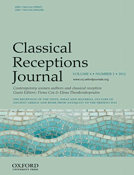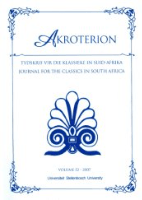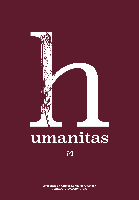
Classical Receptions Journal
Scope & Guideline
Unpacking the Timeless Relevance of Classical Texts
Introduction
Aims and Scopes
- Interdisciplinary Approaches to Classical Texts:
The journal embraces a wide range of methodologies from various disciplines, including literary studies, history, cultural studies, and performance studies, allowing for a multifaceted exploration of classical receptions. - Modern Adaptations and Interpretations:
A significant focus is on how classical texts and themes are adapted in modern literature, theatre, film, and other art forms, showcasing the continuous dialogue between past and present. - Cultural Memory and Heritage:
The journal examines the role of classical antiquity in shaping cultural memory and heritage, including the impact of classical narratives on national identities and historical consciousness. - Gender and Identity in Classical Reception:
There is a strong emphasis on gender studies and the representation of identity in classical receptions, exploring how figures from antiquity are reinterpreted in light of contemporary gender politics and identity discussions. - Global Perspectives on Classical Reception:
The journal also addresses the global dimensions of classical reception, highlighting how various cultures outside the Western tradition engage with and reinterpret classical texts.
Trending and Emerging
- Feminist and Queer Receptions:
An increasing number of articles explore feminist and queer interpretations of classical texts, reflecting a broader cultural interest in gender studies and LGBTQ+ perspectives in literary analysis. - Dark Academia and Aesthetic Movements:
The rise of themes related to Dark Academia and other aesthetic movements signifies a growing interest in how classical antiquity influences contemporary subcultures and artistic expressions. - Postcolonial and Global Perspectives:
Emerging themes include postcolonial readings of classical texts, emphasizing the importance of understanding classical reception within global contexts and historical narratives of empire and resistance. - Memory Studies and Commemoration:
There is a notable trend towards exploring memory studies and the role of classical texts in contemporary commemorative practices, reflecting a societal interest in how the past is remembered and represented. - Intermediality and Cross-genre Adaptations:
A trend towards investigating intermediality—how classical texts are transformed across various media forms—demonstrates a growing fascination with the fluidity of classical reception in modern storytelling.
Declining or Waning
- Traditional Classical Studies:
There appears to be a waning focus on traditional classical studies that emphasize philological or strictly historical approaches, as the journal increasingly prioritizes contemporary interpretations and interdisciplinary methodologies. - Eurocentric Perspectives:
Themes centered on Eurocentric perspectives of classical reception are becoming less prominent, indicating a shift towards more inclusive discussions that consider non-Western engagements with classical texts. - Static Interpretations of Classical Texts:
There is a noticeable decline in articles that provide static or uncritical interpretations of classical texts, with a preference emerging for dynamic and contextual analyses that incorporate modern theoretical frameworks. - Conventional Adaptation Studies:
Research focusing solely on conventional adaptations of classical works in Western media has decreased, suggesting a growing interest in innovative and diverse forms of adaptation that challenge traditional narratives.
Similar Journals

Myrtia
Empowering insights that drive biodiversity conservation.Myrtia is a distinguished academic journal published by Universidad de Murcia, focusing primarily on the fields of environmental sciences and biodiversity. With the ISSN 0213-7674 and E-ISSN 1989-4619, it serves as a vital platform for researchers and professionals to disseminate innovative findings and foster discussions that advance our understanding of ecological dynamics and sustainable practices. The journal reflects a commitment to promoting open access knowledge, aiming to increase the visibility and impact of research in these critical areas. As researchers seek to address pressing environmental challenges, Myrtia remains an essential resource for high-quality, peer-reviewed articles that contribute to a holistic understanding of our ecosystem. Its association with a reputable institution and dedication to scholarly excellence makes it a key player in the academic landscape, inviting contributions that shape future environmental research and policy.

Akroterion-Journal for the Classics in South Africa
Advancing Classical Studies for a Global AudienceAkroterion: Journal for the Classics in South Africa is a premier open-access journal dedicated to advancing the study of classical antiquity within the context of South Africa and beyond. Founded in 1990 and published by SUNJOURNALS, this journal serves as a vital platform for the dissemination of scholarly articles, reviews, and critical perspectives that delve into the rich tapestry of classical literature, history, and culture. Based in Stellenbosch, South Africa, it provides international accessibility for researchers and scholars alike, enhancing the global discourse on classical studies. Despite its classification in the Q4 quartile of Classics and the 17th percentile of Scopus rankings, Akroterion remains committed to fostering innovative research and nurturing emerging voices in the field. By offering an open-access model, it ensures that valuable academic contributions reach a wider audience, empowering enthusiasts and professionals to explore the timeless relevance of classical studies today.

RAMUS-CRITICAL STUDIES IN GREEK AND ROMAN LITERATURE
Exploring the Echoes of AntiquityRAMUS: Critical Studies in Greek and Roman Literature, published by Cambridge University Press, stands as a premier journal dedicated to the exploration and analysis of classical literary texts. Established in 2002, this journal has garnered recognition in its field, achieving a Q1 category ranking in both Classics and Literature and Literary Theory for 2023, which reflects its commitment to scholarly excellence. With an impressive Scopus ranking, where it places in the 76th percentile for Literature and Literary Theory and the 70th percentile for Classics, RAMUS is a critical resource for researchers, professionals, and students engaged in the study of ancient texts and their lasting impact on contemporary literature. Although currently not an open-access journal, it offers a wealth of peer-reviewed articles, reviews, and critical essays that enrich understanding and foster discussions in the realms of Greek and Roman literary traditions. This journal not only serves as an academic platform but also contributes to the ongoing dialogue on the relevance of classical literature in today's cultural and literary discourse.

MNEMOSYNE
Exploring the intersections of history and language.MNEMOSYNE is a prestigious academic journal published by BRILL, specializing in the fields of Archeology, Classics, History, Linguistics and Language, and Literature and Literary Theory. With a remarkable history dating back to its inception in 1948, this journal continues to be a crucial resource for scholars and researchers, spanning its publication years that extend to 2024. The journal boasts high rankings in multiple categories according to Scopus, including Q1 status in Classics and History, reflecting its impact and relevance in the academic community. Although it is not an Open Access journal, its selection of peer-reviewed articles ensures rigorous scholarship that contributes to ongoing discussions and discoveries in the humanities. By providing a platform for innovative research and critical discourse, MNEMOSYNE plays an integral role in advancing the understanding of cultural and historical contexts, making it an essential read for both seasoned academics and emerging scholars alike.

PHOENIX-THE JOURNAL OF THE CLASSICAL ASSOCIATION OF CANADA
Connecting Scholars Through the AgesPHOENIX - THE JOURNAL OF THE CLASSICAL ASSOCIATION OF CANADA is a distinguished academic journal published by the Classical Association of Canada, dedicated to advancing the study of classical antiquity and its enduring influence on contemporary society. With an ISSN of 0031-8299 and an E-ISSN of 1929-4883, PHOENIX serves as a pivotal platform for researchers, educators, and students in the field of classics. Although without open access provisions, the journal is noted for its rigorous peer-review process, ensuring the publication of high-quality scholarship that meets the academic community's standards. With its back issues archived since 2002, the journal is supported by a strong reputation, evidenced by its Scopus ranking in the 80th percentile in the Arts and Humanities - Classics category. Based in Toronto, Ontario, it continues to foster scholarly dialogue and exploration of themes ranging from ancient texts to contemporary interpretations of classical traditions. By prioritizing diverse contributions that enhance our understanding of classical studies, PHOENIX remains a vital resource for anyone engaged in the rich and varied exploration of the ancient world.

Acta Classica
Connecting Scholars to the Heart of Classical StudiesActa Classica is a distinguished journal dedicated to the field of Classics, published by the Department of English in Classical Languages at the University of Free State, South Africa. With its ISSN 0065-1141 and E-ISSN 2227-538X, this journal has been a pivotal platform for scholarly discourse since its inception in 1973, notably converging and evolving significantly in its content from 2010 to 2023. Although it currently holds a Q4 classification in Classics, its Scopus ranking at #88 out of 170 in the Arts and Humanities reflects its relevance in academic circles, with a 47th percentile standing. The journal aims to publish high-quality research articles, reviews, and critical essays that not only explore the rich tapestry of ancient civilizations but also contribute to contemporary understandings of classical languages and literature. While its content is not openly accessible, Acta Classica remains an essential resource for researchers, professionals, and students who seek to deepen their knowledge and engagement with Classical studies.

Humanitas-Portugal
Advancing Knowledge in the HumanitiesHumanitas-Portugal is a distinguished open access journal published by IMPRENSA UNIV COIMBRA that has been fostering scholarly dialogue since its inception in 1947. With an ISSN of 0871-1569 and E-ISSN 2183-1718, the journal serves as a platform for rigorous academic work in the fields of Archeology, Classics, History, Philosophy, and Religious Studies. Although positioned in the Q4 quartile by Scopus rankings, its commitment to accessibility and knowledge dissemination in Portugal highlights its significance to the academic community. Researchers and students can access articles openly, encouraging a broader engagement with various disciplines. With its convergence of studies from 2018 to 2024, Humanitas-Portugal continues to contribute to the understanding of human culture and thought, making it an essential resource for anyone invested in the humanities.

Rivista di Filologia e di Istruzione Classica
Unveiling the Rich Tapestry of Classical TextsRivista di Filologia e di Istruzione Classica is a distinguished academic journal published by LOESCHER EDITORE, dedicated to advancing the fields of Classics and Linguistics. Based in Italy, this journal serves as a vital platform for original research, critical analysis, and scholarly discussions that enrich our understanding of classical texts and educational methodologies in the humanities. With its unique focus on the intricate relationship between classical literature and language, the journal aims to facilitate discourse among researchers, educators, and students alike. Although categorized in the fourth quartile in both Classics and Linguistics, it provides an essential venue for scholars seeking to disseminate their findings and engage with contemporary academic debates. The journal is indexed in various databases, though recent coverage in Scopus has been discontinued. Researchers interested in exploring the complex layers of classical philology and instructional practices are encouraged to contribute to and engage with the innovative scholarship presented in this journal.

Auster
Connecting ideas across the Humanities and Educational Sciences.Auster is a prominent open-access journal dedicated to advancing interdisciplinary research within the fields of Humanities and Educational Sciences. Published by the esteemed Universidad Nacional de La Plata, specifically by the Faculty of Humanities and Educational Sciences, this journal has been a cornerstone for scholarly discourse since its establishment in 1996. With an ISSN of 1514-0121 and an E-ISSN of 2346-8890, Auster ensures wide accessibility to innovative research and critical analyses. Its commitment to open access fosters an inclusive academic environment, allowing researchers, students, and professionals in Argentina and beyond to engage with high-quality content that stimulates new ideas and interdisciplinary collaboration. The journal strives to publish timely, relevant articles that explore contemporary challenges in humanities and education, thereby positioning itself as an essential resource for anyone invested in these dynamic fields.

Studia Austriaca
Advancing Scholarly Discourse in Cultural StudiesStudia Austriaca, published by Milano University Press, is a distinguished open-access journal that has been promoting scholarly discourse in the realms of Cultural Studies and Literature since its inception in 1992. Based in Italy, this journal aims to serve as a vital platform for researchers, professionals, and students seeking to explore the complexities of Austrian culture and its literary contributions. With ISSN 1593-2508 for print and E-ISSN 2385-2925 for online access, Studia Austriaca offers a comprehensive repository of articles that reflect a dynamic understanding of cultural interactions. Although its current Scopus rankings place it in the lower percentiles of the Arts and Humanities categories, the journal's commitment to maintaining high academic standards and facilitating open access ensures that it remains an essential reference for academic inquiry. The journal's coverage is set to continue evolving, with converged years extending from 2017 to 2024, thus paving the way for emerging discussions and research developments in the fields of literature and cultural studies.